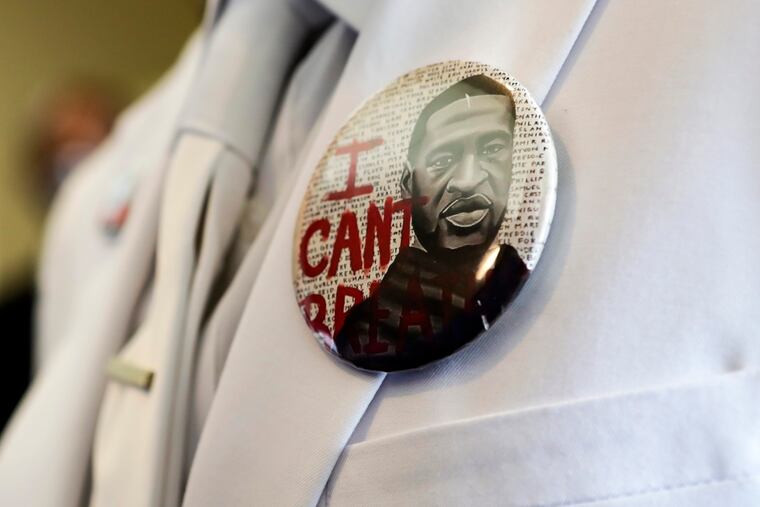Drafting a fresh blueprint for racial justice | Solomon Jones
In a new book, Solomon Jones describes the inner workings of a criminal justice system that enables Black people to be killed or harmed with near impunity — and how to change it.

The deadly stories of Black people harmed by America’s criminal justice system keep coming, and with each one, the heartbreak worsens. The latest, the killing of 8-year-old Fanta Bility by police officers in Sharon Hill, Delaware County, is yet another example of why the system must be changed.
Fanta, who was killed when police officers fired toward a crowd after they heard gunshots following a high school football game, is not the first Black child to be killed by police who operate recklessly in Black communities. While the officers involved now face multiple charges including manslaughter after a grand jury investigation, the pattern of killing is too obvious to be handled one case at a time. There must be systemic change, or there will be another Fanta Bility, another George Floyd, another Tamir Rice, another Sandra Bland.
That’s why I wrote Ten Lives, Ten Demands: Life-and-Death Stories, and a Black Activist’s Blueprint for Racial Justice. It’s my 11th book, but it’s my first on the topic of race. Published on Tuesday, the book recounts the stories of 10 people whose lives were lost or damaged by a criminal justice system that is undergirded by racism. The inner workings of that system enable police officers and vigilantes to kill or harm Black people with near impunity. But in order to change that system, we must first understand how it functions, and then, before we take to the streets in protest, we must formulate specific demands.
» READ MORE: Black people stood up to racist policing and got results. Where is that story? | Solomon Jones
I learned that truth through hard-won experience, when my readers and radio listeners did something I didn’t expect.
It happened in the summer of 2019, when it was revealed that 372 current and former Philadelphia police officers had allegedly written racist and otherwise offensive messages on Facebook. When I expressed my outrage, some Inquirer readers emailed me with hateful expressions of support for the officers’ racism. Others, like many of my radio listeners, asked a simple question: What was I was going to do about it?
That question pushed me to convene a coalition of leaders who held protests and pressured politicians. We hosted community meetings and confronted City Council. We rallied at Police Headquarters and negotiated with the mayor and police commissioners. We moved in unison and did so while brandishing a specific list of demands. That’s how we got more than a dozen of those police officers off the force, and that’s how I learned what Black people must do in order to bring national change.
No movement can succeed without demands, strategy, teamwork, and vision. No movement can succeed without faith. It was faith, after all, that allowed me to rebuild my life with little more than prayers, a laptop, and a microphone. Faith that enabled me to rise from addiction and homelessness to become a husband and father. Faith that allows me to speak truth for my community, and use writing as a force for change.
» READ MORE: George Floyd was somebody, and his death can’t be in vain | Solomon Jones
Ten Lives, Ten Demands takes a closer look at the families whose stories I’ve told in these pages and on the airwaves. It speaks the truth of Tracy Martin, whose son Trayvon was killed by George Zimmerman. It shares the determination of Geneva Reed Veale, the mother of Sandra Bland, who died alone in a Texas jail cell. It illuminates the genius of Hassan Bennett, who represented himself and was released after he was wrongfully convicted. Combining those with the stories of George Floyd, Alton Sterling, Michael Brown, and so many others, this book doesn’t just lay the groundwork for justice. It also peers into truths about myself.
In it, you’ll learn why I believe that men who’ve had brushes with the criminal justice system can reform. You’ll learn why I believe that even those who seem hopeless can change. Most of all, you’ll learn why I believe Frederick Douglass was right to say, “Power concedes nothing without a demand. It never did and it never will.”
Ten Lives, Ten Demands. Read it … and let’s get to work.
Solomon Jones reads and signs copies of his new book, “Ten Lives, Ten Demands: Life-and-Death Stories, and a Black Activist’s Blueprint for Racial Justice” at the Free Library Parkway Central Branch, 1901 Vine St., Philadelphia, Wednesday, 7:30 p.m.